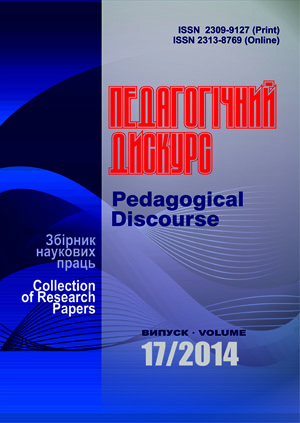Methodological Model of Forming the Bases of Moral Consciousness of Junior Schoolchildren by Means of Children Literature
Abstract
The concept and methodological model of qualitatively new educational system, worked out on the bases of humanistic person-oriented methodology, have been offered in the article. The works of great moral teachers and pedagogues, whose scientific interest was moral consciousness of personality, have been studied in details. In the basis of methodological model of forming moral consciousness of junior schoolchildren, which is offered in the article are new educational methods of person-oriented education, on the bases of which a pedagogue can scientifically grounded teach a child. The content of the article deals with clearing out every structural-functional part of methodological model. It is emphasized in the conclusions that methodological model is directed to the child, works in children’s interests; it is humanistic and democratic by the spirit; it is systemic and successive by the structure, content; it is full of personal approach to the child; it guaranties the ability of prognostication of the results of the educational influence; it involves personaly-oriented pedagogical cooperation, the essence of which is the following – the pedagogue is always by the child’s side, but not above the child.
Downloads
References
Bekh I. D. Vykhovannya pidrostayuchoyi osobystosti na zasadakh novoyi metodolohiyi / I. D. Bekh // Pedahohika i psykholohiya. – 2012. – №3. – S.5–14.
Vashchenko H. Vykhovnyy ideal / H. Vashchenko. – Poltava, 1994. – 191 s.
Istoriya pedahohiky / Za red. M. V. Levkivsʼkoho, O. A. Dubasenyuk. – Zhytomyr: Polihrafichnyy tsentr ZHDPU, 1999. – 336 s.
Kant M. Osnovy metafyzyky nravstvennosty: Sobranye sochynenyy: v 6 t. / M. Kant. – M. : Prosveshchenye, 1965. – T. 4. – 320 s.
Malakhov V. A. Etyka: navch. posib. / V. A. Malakhov. – K. : Lybidʼ, 1996. – 304 s.
Plakhtiy V. I. Pokaznyky ta rivni sformovanosti moralʼnoyi svidomosti osobystosti / V. I. Plakhtiy // Naukovi zapysky Vinnytsʼkoho derzhavnoho pedahohichnoho universytetu imeni M.Kotsyubynsʼkoho: Seriya: Pedahohika i psykholohiya. – Vypusk 6. – Vinnytsya: RVVDP «Derzhavna kartohrafichna fabryka», 2012 – S.75–80.
Plakhtiy V. I. Formuvannya moralʼnykh idealiv molodshykh shkolyariv / V. I. Plakhtiy // Naukovi zapysky Vinnytsʼkoho derzhavnoho pedahohichnoho universytetu im. M.Kotsyubynsʼkoho: Seriya: Pedahohika i psykholohiya. – Vypusk 3. – Vinnytsya: VAT «Vinobldrukarnya», 2000. – S.90–93.
Sotsialna filosofiya: navch. posib. / V. P. Andrushchenko, M. I. Mykhalʼchenko. – K. : Heneza, 1996. – 599 s.
Sukhomlynsʼkyy V. O. Vybrani tvory: V 5 t. / V. O. Sukhomlynsʼkyy. – K. : Radyansʼka shkola, 1976. – T.1. – 654 s.
Filosofiya: navch. posib. / Nadolʼnyy I. F., Andrushchenko V. P., Boychenko I. V., Rozumnyy V. P. ta in. – K. : Vikar, 1997. – 584 s.
Shvartsman K. A. Fylosofyya y vospytanye / K. A. Shvartsman. – M. : Prosveshchenye, 2009. – 205 s.

This work is licensed under a Creative Commons Attribution-NonCommercial-ShareAlike 4.0 International License.

















